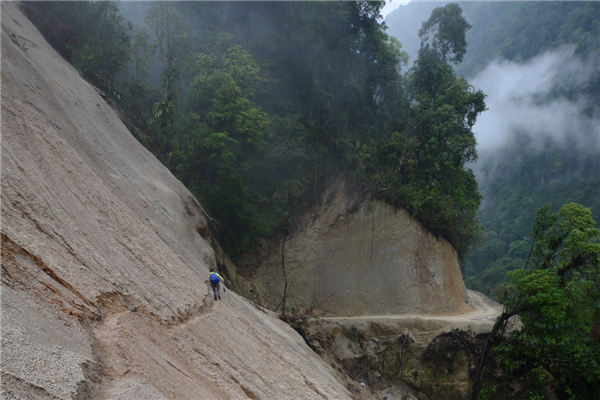Tough science
 |
|
It's dangerous to get across a landslide caused by heavy rains. Niu Yang/ for China Daily |
Walking out
The rain had reduced to one or two drizzles a day. There was no positive news from Mapo. "I just feel we can't wait here forever," Cheng says. "Someone has to go out and evaluate the situation."
He left on the morning of May 16. The 34-year-old from Zhuhai, Guangdong province, reached Mapo by foot in three hours and found only six of the 32 landslide sites cleared by a digger. "People worked for two days to clean only six sites," he says. "So I think they need at least four or five days to break through the blocked section."
Back in Qinlangdang, the other members of the team received a message from Cheng that it could be four of five days longer before the roads were cleared. Deciding that was too long to wait, the 12 members left their cars and heavy luggage behind and walked to Mapo, where they were able to catch the bus to Dulongjiang township that evening.
On May 21, the three drivers returned to Qinlangdang to retrieve the cars. The expedition reached Gongshan on May 22. Three IBE photographers went home and the other five had another two-day survey in Fugong county.
At an altitude of 2,500 meters above sea level, Lei Bo found another interesting stick insect and felt reluctant to end the survey. "Because of the bad weather and roads, we actually didn't have enough time to work at every place," he says. "That's my only regret."
Back home, Cheng Bin found that he needed to process 90,000 photos and 1,000 video clips from the trip. Image materials from Cheng and his fellows will help IBE publish a field guide on wildlife for the Gaoligong Mountains reserve, says IBE director Xu Jian.
Related:
Surviving as a wildlife photographer
Preserving Dulong River valleys


















